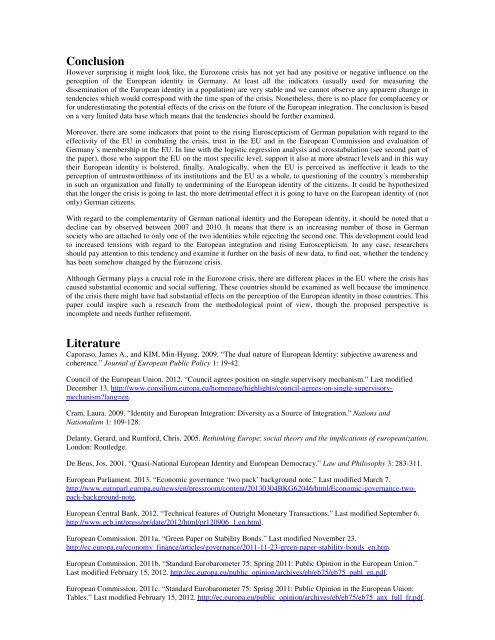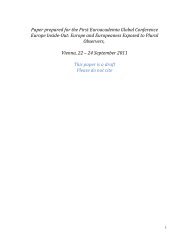Daniel Kný Transformation of German-European ... - Euroacademia
Daniel Kný Transformation of German-European ... - Euroacademia
Daniel Kný Transformation of German-European ... - Euroacademia
Create successful ePaper yourself
Turn your PDF publications into a flip-book with our unique Google optimized e-Paper software.
Conclusion<br />
However surprising it might look like, the Eurozone crisis has not yet had any positive or negative influence on the<br />
perception <strong>of</strong> the <strong>European</strong> identity in <strong>German</strong>y. At least all the indicators (usually used for measuring the<br />
dissemination <strong>of</strong> the <strong>European</strong> identity in a population) are very stable and we cannot observe any apparent change in<br />
tendencies which would correspond with the time span <strong>of</strong> the crisis. Nonetheless, there is no place for complacency or<br />
for underestimating the potential effects <strong>of</strong> the crisis on the future <strong>of</strong> the <strong>European</strong> integration. The conclusion is based<br />
on a very limited data base which means that the tendencies should be further examined.<br />
Moreover, there are some indicators that point to the rising Euroscepticism <strong>of</strong> <strong>German</strong> population with regard to the<br />
effectivity <strong>of</strong> the EU in combating the crisis, trust in the EU and in the <strong>European</strong> Commission and evaluation <strong>of</strong><br />
<strong>German</strong>y´s membership in the EU. In line with the logistic regression analysis and crosstabulation (see second part <strong>of</strong><br />
the paper), those who support the EU on the most specific level, support it also at more abstract levels and in this way<br />
their <strong>European</strong> identity is bolstered, finally. Analogically, when the EU is perceived as ineffective it leads to the<br />
perception <strong>of</strong> untrustworthiness <strong>of</strong> its institutions and the EU as a whole, to questioning <strong>of</strong> the country´s membership<br />
in such an organization and finally to undermining <strong>of</strong> the <strong>European</strong> identity <strong>of</strong> the citizens. It could be hypothesized<br />
that the longer the crisis is going to last, the more detrimental effect it is going to have on the <strong>European</strong> identity <strong>of</strong> (not<br />
only) <strong>German</strong> citizens.<br />
With regard to the complementarity <strong>of</strong> <strong>German</strong> national identity and the <strong>European</strong> identity, it should be noted that a<br />
decline can by observed between 2007 and 2010. It means that there is an increasing number <strong>of</strong> those in <strong>German</strong><br />
society who are attached to only one <strong>of</strong> the two identities while rejecting the second one. This development could lead<br />
to increased tensions with regard to the <strong>European</strong> integration and rising Euroscepticism. In any case, researchers<br />
should pay attention to this tendency and examine it further on the basis <strong>of</strong> new data, to find out, whether the tendency<br />
has been somehow changed by the Eurozone crisis.<br />
Although <strong>German</strong>y plays a crucial role in the Eurozone crisis, there are different places in the EU where the crisis has<br />
caused substantial economic and social suffering. These countries should be examined as well because the imminence<br />
<strong>of</strong> the crisis there might have had substantial effects on the perception <strong>of</strong> the <strong>European</strong> identity in those countries. This<br />
paper could inspire such a research from the methodological point <strong>of</strong> view, though the proposed perspective is<br />
incomplete and needs further refinement.<br />
Literature<br />
Caporaso, James A., and KIM, Min-Hyung. 2009. “The dual nature <strong>of</strong> <strong>European</strong> Identity: subjective awareness and<br />
coherence.” Journal <strong>of</strong> <strong>European</strong> Public Policy 1: 19-42.<br />
Council <strong>of</strong> the <strong>European</strong> Union. 2012. “Council agrees position on single supervisory mechanism.” Last modified<br />
December 13. http://www.consilium.europa.eu/homepage/highlights/council-agrees-on-single-supervisorymechanismlang=en.<br />
Cram, Laura. 2009. “Identity and <strong>European</strong> Integration: Diversity as a Source <strong>of</strong> Integration.” Nations and<br />
Nationalism 1: 109-128.<br />
Delanty, Gerard, and Rumford, Chris. 2005. Rethinking Europe: social theory and the implications <strong>of</strong> europeanization.<br />
London: Routledge.<br />
De Beus, Jos. 2001. “Quasi-National <strong>European</strong> Identity and <strong>European</strong> Democracy.” Law and Philosophy 3: 283-311.<br />
<strong>European</strong> Parliament. 2013. “Economic governance ‘two pack’ background note.” Last modified March 7.<br />
http://www.europarl.europa.eu/news/en/pressroom/content/20130304BKG62046/html/Economic-governance-twopack-background-note.<br />
<strong>European</strong> Central Bank. 2012. “Technical features <strong>of</strong> Outright Monetary Transactions.” Last modified September 6.<br />
http://www.ecb.int/press/pr/date/2012/html/pr120906_1.en.html.<br />
<strong>European</strong> Commission. 2011a. “Green Paper on Stability Bonds.” Last modified November 23.<br />
http://ec.europa.eu/economy_finance/articles/governance/2011-11-23-green-paper-stability-bonds_en.htm.<br />
<strong>European</strong> Commission. 2011b. “Standard Eurobarometer 75: Spring 2011: Public Opinion in the <strong>European</strong> Union.”<br />
Last modified February 15, 2012. http://ec.europa.eu/public_opinion/archives/eb/eb75/eb75_publ_en.pdf.<br />
<strong>European</strong> Commission. 2011c. “Standard Eurobarometer 75: Spring 2011: Public Opinion in the <strong>European</strong> Union:<br />
Tables.” Last modified February 15, 2012. http://ec.europa.eu/public_opinion/archives/eb/eb75/eb75_anx_full_fr.pdf.











